 |
|||||
|
|||||
| Preview of Stamps Catalogue: VOLUME 1 |
 |
|||||
|
|||||
| Preview of Stamps Catalogue: VOLUME 1 |
Return To Catalogue - Bavaria 1849 issue, forgeries of the 1 kr black value, part 2 - Bavaria 1849 issue - Other German States - Germany
Note: on my website many of the
pictures can not be seen! They are of course present in the catalogue;
contact me if you want to purchase it.
Currency: 60 Kreuzer = 1 Gulden, after 1875 100 Pfennig = 1 Mark

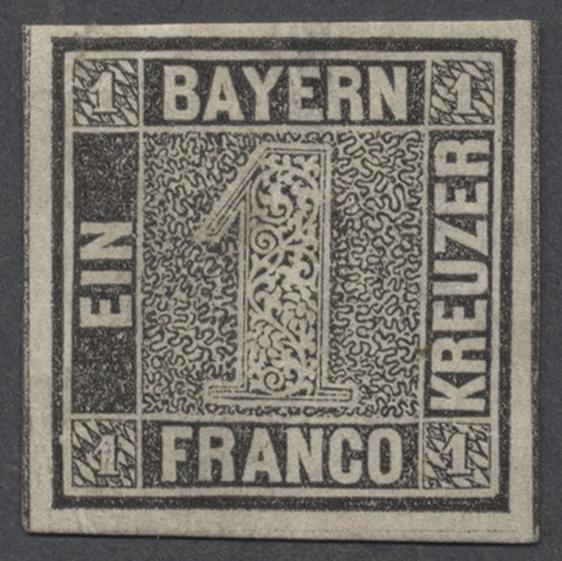
Certified genuine 1 k black stamps
The rare 1 k black has been the target of most forgers (more than 20 different kinds of forgeries exist), but the 12 k and 18 k values were also forged.
The genuine 1 k black has:
1) A white lozenge in the upper right corner which connects to
the white inner frameline.

Test 1, the white lozenge.
2) There is a small space with ornaments between the large "1" and "BAYERN". The top of the "1" is slanting slightly backwards.
3) The right bottom corner of the central design shows a "SS" ornament.
Bavaria 1849 issue, forgeries of the 1 kr black value, part 2
Examples:
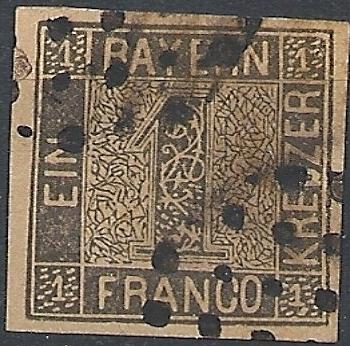
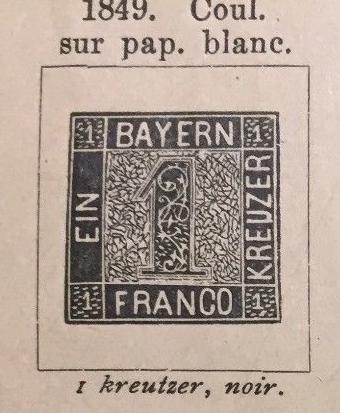
This forgery is apparently based on an illustration in an old
French stamp album (second image)

This forgery has a white circle around the "1", the
genuine stamp does not have this.

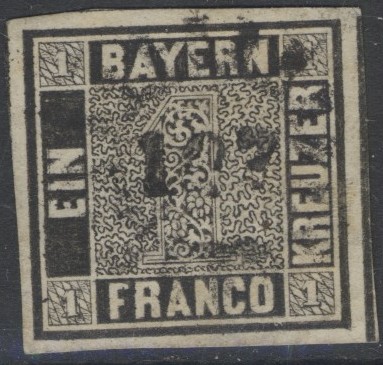
This forgery has the background behind the small "1"s
in the corners different from the genuine stamps. It is listed as
forgery VII by the German Philatelic Society.


Two forgeries, possibly made by the same forger. Note the short
right leg of the second "R" of "KREUZER". I
presume this is forgery Type VIII or Type I of the German
Philatelic Society.

The background pattern behind the large "1" in the
center is too coarse. The black frame around "FRANCO"
is tilting downwards at the right (behind the "O"),
instead of being vertical. This forgery is also described as
forgery Type XX by the German Philatelic Society.

(I have also seen this forgery uncancelled)
Some forgeries have the top of the large "1" too close to the label with "BAYERN"; the ornaments between the "1" and this label have completely or partly disappeared:
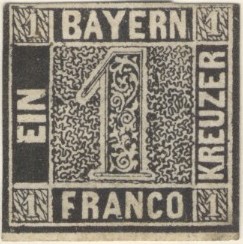


Example of a forgery with the large "1" too close to
the label with "BAYERN". The letters "ERN" of
"BAYERN" are placed closer to each other than in the
genuine stamps. This forgery is also described as forgery Type IV
by the German Philatelic Society.



I presume this is forgery V indentified as such by the by the
German Philatelic Society. The central part of the "E"
of "EIN" is too short. In some of the forgeries of this
type that I have seen, there is a black vertical line in the
white space above the left part of the "R" of
"FRANCO". The vertical part of the "R" of
"FRANCO" has a break in the middle. I've also seen this
forgery cancelled with a pattern of black parallel lines.
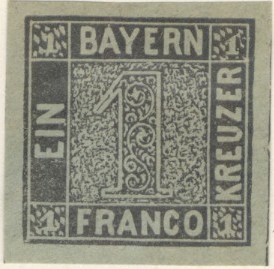
A forgery with all "E"s too narrow.


Forgery based on a photograph(?). With "Faksimile" at
the bottom left and on the back.

Forgery with the "1"s in the corners too small; also
the background pattern behind the large "1" is
different from a genuine stamp.

Another forgery, note the different background pattern,
especially to the upper left of the large "1".
'Reprint' made in 1920, together with genuine stamps and the last Bavaria stamp on a postcard:







Rather badly done forgery, also in a pair of two with a large
space in between. The "N" of "BAYERN" is very
badly done. All "R"s are pretty clumsy. There are dots
on top of the "A" of 'FRANCO" (but not always?).
This forgery is also described as forgery Type XIII by the German
Philatelic Society. It is said there that this forgery often
occurs with a "159" numeral cancel. I've seen them on
several souvenir cards.
Note that the background pattern behind the large "1"
is different from a genuine stamp.
Faksimile 1991:

('Faksimile 1991' tete beche stamps, reduced sizes)


Here pasted on a forged old letter. The "243" cancel is
also forged. I've seen exactly the same letter (same handwriting
and "Nurnberg" cancel but with the forgery placed in a
slightly different spot).
In 1987 a minisheet was issued to commemorate the birthday of Peter Haseney, the designer of the first stamp of Bavaria. It has the 1 k black, 3 k blue and 6 k brown facsimiles printed on it. The text at the bottom of each stamp is 'Facsimile'(?). The text on the minisheet is '175. Geburtstag von Peter Haseney, dem Schopfer der ersten deutschen Briefmarke'. The minisheet was printed by Gehringer.


"Reprints" with inscription "BUCHDRUCK-REPLIKAT
DER BUNDESDRUCKEREI" at the back. It is very well done, but
the lozenge in the upper right corner is closed instead of being
connected to the white line (see the distinguishing
characteristics above).


Another block of 4 reprints with "NACHDRUCK" printed at
the back.



Photographic reproduction made in 1961, with
"Reproduktion" printed at the back. The dots of the
photograph are clearly visible when zoomed in. The 6 k brown was
also made in a similar fashion (see there).
Below the stamp at the back the text "15.Bundestag
62.Philatelistentag Nurnberg 1961" is printed.
Bavaria 1849 issue, forgeries of the 1 kr black value, part 2
For issues of Bavaria in the period 1867 to 1876 click here.